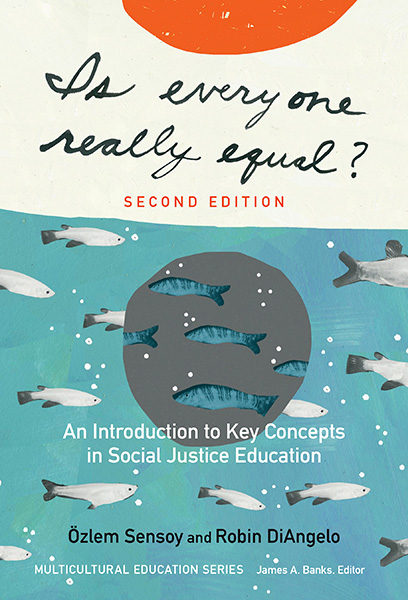Professors: Request an Exam Copy
Print copies available for US orders only. For orders outside the US, see our international distributors.
Second Edition
Publication Date: July 28, 2017
Pages: 288
Series: Multicultural Education Series

This award-winning guide to social justice education is appropriate for students from high school through graduate school.
Based on the authors’ extensive experience in a range of settings in the United States and Canada, the book addresses the most common stumbling blocks to understanding social justice. This comprehensive resource includes new features such as a chapter on intersectionality and classism; discussion of contemporary activism (Black Lives Matter, Occupy, and Idle No More); material on White Settler societies and colonialism; pedagogical supports related to “common social patterns” and “vocabulary to practice using”; and extensive updates throughout.
Accessible to students from high school through graduate school, Is Everyone Really Equal? is a detailed and engaging textbook and professional development resource presenting the key concepts in social justice education. The text includes many user-friendly features, examples, and vignettes to not just define but illustrate the concepts.
Book Features:
Özlem Sensoy is associate professor in the faculty of education at Simon Fraser University, Vancouver, Canada. Robin DiAngelo is lecturer in the School of Social Work at the University of Washington, Seattle, United States.
"Özlem Sensoy and Robin DiAngelo take on an important yet challenging task in Is Everyone Really Equal?: An Introduction to Key Concepts in Social Justice Education (2nd edition): providing a primer that strives to balance complexity and accessibility in critical social justice education for a broad audience."
—Teachers College Record
"This useful guide explains concepts such as prejudice, discrimination, oppression, privilege, and white supremacy. It also provides answers to objections that are often raised when these ideas are discussed."
—New Labor Forum
"...Sensoy and DiAngelo’s book merits consideration by all readers interested in social justice education in pluralistic society."
—Reflective Teaching
“Sensoy and DiAngelo masterfully unpack complex concepts in a highly readable and engaging fashion for readers ranging from preservice through experienced classroom teachers. The authors treat readers as intelligent thinkers who are capable of deep reflection and ethical action. I love their comprehensive development of a critical social justice framework, and their blend of conversation, clarity, and research. I heartily recommend this book!”
—Christine Sleeter, professor emerita, California State University Monterey Bay
“The authors provide an inspired yet accessible lens into how social inequity is reproduced. This is an incredible gift for encouraging their audience to reexamine views on race, gender, and minority stereotypes. This book will change you!”
—Dr. Byron D. Joyner, vice dean for Graduate Medical Education and Designated Institutional Official, University of Washington
“Sensoy and DiAngelo bring their knowledge and insights as engaged educators and scholars to this second edition. They have thoughtfully updated their chapters, concepts, and examples for the current sociocultural and political climate of teaching and learning in contemporary schools. A wonderful, accessible text!”
—Annette Henry, David Lam Chair in Multicultural Education and professor, University of British Columbia
Contents
Series Foreword James A. Banks
Acknowledgments
Preface
What Is "Critical Social Justice"?
Chapter Summaries
Prologue
A Parable: Hodja and the Foreigner
Layers of the Parable
1. How to Engage Constructively in Courses That Take a Critical Social Justice Approach
An Open Letter to Students
A Story: The Question of Planets
Guideline 1: Humility
Guideline 2: Informed Knowledge
Guideline 3: Patterns
Guideline 4: Self-Knowledge
Guideline 5: Positionality
Grading
2. Critical Thinking and Critical Theory
Two Dimensions of Thinking Critically About Knowledge
What is Critical Theory?
Why Theory Matters
Knowledge as Socially Constructed
Thinking Critically About Opinions
3. Culture and Socialization
What Is Culture?
What Is Socialization?
Cultural Norms and Conformity
“You” in Relation to the “Groups” to Which You Belong
4. Prejudice and Discrimination
Prejudice
Discrimination
All Humans Have Prejudice and Discriminate
5. Oppression and Power
Oppression
Social Stratification
Understanding the "isms"
Internalized Dominance
Internalized Oppression
Hegemony, Ideology, and Power
6. Understanding Privilege Through Ableism
What Is Privilege?
External and Structural Dimensions of Privilege
Internal and Attitudinal Dimensions of Privilege
Common Dominant Group Misconceptions About Privilege
7. Understanding the Invisibility of Oppression Through Sexism
What Is an Institution?
An Example: Sexism Today
What Makes Sexism Difficult to See?
Discourses of Sexism in Advertising
Discourses of Sexism in Movies
Discourses of Sexism in Music Videos
8. Understanding the Structural Nature of Oppression Through Racism
What is Race?
A Brief History of the Social Construction of Race in the United States
A Brief History of the Social Construction of Race in Canada
What Is Racism?
Two Key Challenges to Understanding Racism
Racism Today
Dynamics of White Racial Superiority
Dynamics of Internalized Racial Oppression
Racism and Intersectionality
9. Understanding the Global Organization of Oppression Through White Supremacy
What Is Whiteness?
White Supremacy in the Global Context
Common White Misconceptions about Racism
10. Understanding Intersectionality Through Classism
What Are Class and Classism?
Class Socialization
Common Misconceptions about Classism
Class and Intersectionality
Class Privilege
Common Classist Beliefs
11. "Yeah, But...": Common Rebuttals
Claiming That Schools Are Politically Neutral
Dismissing Social Justice Scholarship as Merely the Personal Opinions of Individual "Left Wing" Professors
Citing Exceptions to the Rule
Arguing That Oppression Is Just "Human Nature"
Appealing to a Universalized Humanity
Insisting on Immunity from Socialization
Ignoring Intersectionality
Refusing to Recognize Structural and Institutional Power
Rejecting the Politics of Language
Invalidating Claims of Oppression as Over-Sensitivity
Reasoning That If Choice Is Involved It Can't Be Oppression
Positioning Social Justice Education as Something "Extra"
Claiming This Is Just to Make People Feel Guilty
12. Putting It All Together
Recognize How Relations of Unequal Social Power Are Constantly Being Negotiated
Understand Our Own Positions Within Relations of Unequal Power
Think Critically About Knowledge
Act in Service of a More Just Society
Glossary
References
Index
About the Authors
2018 Society of Professors of Education Outstanding Book Award
2012 AESA Critics' Choice Award
Professors: Request an Exam Copy
Print copies available for US orders only. For orders outside the US, see our international distributors.